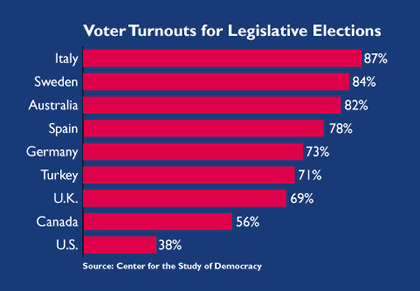"Freedom. America. The two words go together like a drum and its drumbeat," Orlando Patterson told a Sanders Theatre audience shortly before Election Day, arguing that freedom and democracy, two foundational ideas intertwined in our nation's history, have nevertheless in recent times become separated from one another. The Cowles professor of sociology delivered the annual David Riesman Lecture to an audience that one might wish, in retrospect, had been Floridian.

Patterson decried "the dismal state of our participatory democracy, the very foundation of any free society," noting that in 1996, "less than half the eligible voters elected Bill Clinton to office, the worst turnout in 70 years." (This year, millions of eligible voters did not participate in a presidential election decided by mere hundreds of votes.) Voter participation in congressional elections is even worse, ranking "near the bottom of democracies in the number of eligible voters who elect their legislative bodies" (see graph). Patterson also noted a parallel decline in other forms of civic participation among Americans.
This stands in sharp juxtaposition to Americans' frequent and liberal use of the word "freedom," both in the past and now. As Patterson put it--borrowing a favorite phrase from Aeschylus--Americans are endlessly "bawling their liberty." But what do Americans mean when they invoke "freedom," Patterson asked, if they do not mean participating in the democracy of the republic? How is it that freedom and democracy have become separated in American life?
To find out, Patterson asked ordinary Americans about their "definitions or notions of freedom." In his survey of about 1,500 people, the most frequently mentioned definitions were those characterizing freedom as "the desire and ability to do what one wants"; to say what one wants; to make personal choices; and to "move about as one pleases." What struck Patterson most, however, was what was not said. "Amazingly, even though the survey was conducted in the midst of a hotly contested presidential primary campaign, an insignificant number of Americans mentioned democracy or any aspect of government in their definition of freedom." When Patterson asked about experiences of freedom, the most frequently mentioned example was that of "moving about," as in a car, or even in the sense of moving from state to state.
What has happened in the United States, Patterson said, is that "the freedom that is alive and well is largely confined to the private, interpersonal domains of life." Civic notions and experiences of freedom have fallen prey to a "sustained propaganda that the state [is] an evil leviathan, hostile to personal interests and social security, and the view that small government and less government is necessarily better government, that democracy is nothing more than the least of all evils." Then Patterson added, quoting Riesman, "It is hard to find satisfaction in a society whose best defense is that it is less evil than some other social form."
Americans, concluded Patterson, "are not turned off democracy per se..., but [are turned] against politicians....Whatever the causes, the broken and sick state of our democracy is a fact, and it threatens the other freedoms that we claim to cherish." He ended with a plea: "Instead of blaming the people and their apathy for this grim state of our democracy, we who are among the leaders of this great country--or are training to become its leaders--should heed David Riesman's appeal for what he calls a 'saving remnant' of autonomous persons alert to the dangers that a sick democracy poses to the entirety of our freedom....[Riesman says,] 'People can become deeply attached only to a society which takes account of their longings for connection with each other...[and] to the degree that capitalist individualism has fostered an ethic of callousness, the result has been to undermine all forms of individualism, good and bad'"--and, Patterson added, "all forms of freedom."








